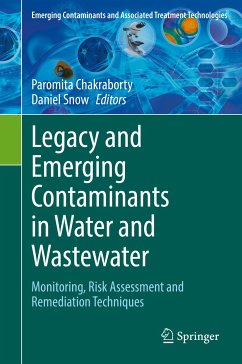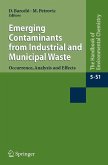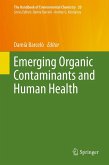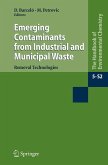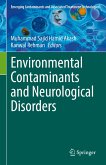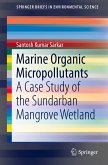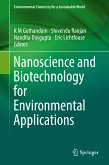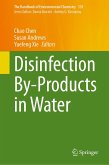Legacy and Emerging Contaminants in Water and Wastewater (eBook, PDF)
Monitoring, Risk Assessment and Remediation Techniques
Redaktion: Chakraborty, Paromita; Snow, Daniel


Alle Infos zum eBook verschenken

Legacy and Emerging Contaminants in Water and Wastewater (eBook, PDF)
Monitoring, Risk Assessment and Remediation Techniques
Redaktion: Chakraborty, Paromita; Snow, Daniel
- Format: PDF
- Merkliste
- Auf die Merkliste
- Bewerten Bewerten
- Teilen
- Produkt teilen
- Produkterinnerung
- Produkterinnerung

Hier können Sie sich einloggen

Bitte loggen Sie sich zunächst in Ihr Kundenkonto ein oder registrieren Sie sich bei bücher.de, um das eBook-Abo tolino select nutzen zu können.
This volume provides a collection of research findings on the distribution and risk associated with emerging contaminants (ECs) in water and wastewater across the globe, and effective remediation techniques and technologies. The book covers various monitoring techniques for ECs in water and wastewater and its related impacts on the ambient environment, and offers valuable information on cost-effective monitoring techniques and sustainable treatment technologies for ECs. The authors detail the risks and biological effects of ECs and legacy persistent organic pollutants (POPs) in freshwater and…mehr
- Geräte: PC
- ohne Kopierschutz
- eBook Hilfe
- Größe: 10.55MB
![Emerging Contaminants from Industrial and Municipal Waste (eBook, PDF) Emerging Contaminants from Industrial and Municipal Waste (eBook, PDF)]() Emerging Contaminants from Industrial and Municipal Waste (eBook, PDF)161,95 €
Emerging Contaminants from Industrial and Municipal Waste (eBook, PDF)161,95 €![Emerging Organic Contaminants and Human Health (eBook, PDF) Emerging Organic Contaminants and Human Health (eBook, PDF)]() Emerging Organic Contaminants and Human Health (eBook, PDF)233,95 €
Emerging Organic Contaminants and Human Health (eBook, PDF)233,95 €![Emerging Contaminants from Industrial and Municipal Waste (eBook, PDF) Emerging Contaminants from Industrial and Municipal Waste (eBook, PDF)]() Emerging Contaminants from Industrial and Municipal Waste (eBook, PDF)161,95 €
Emerging Contaminants from Industrial and Municipal Waste (eBook, PDF)161,95 €![Environmental Contaminants and Neurological Disorders (eBook, PDF) Environmental Contaminants and Neurological Disorders (eBook, PDF)]() Environmental Contaminants and Neurological Disorders (eBook, PDF)97,95 €
Environmental Contaminants and Neurological Disorders (eBook, PDF)97,95 €![Marine Organic Micropollutants (eBook, PDF) Marine Organic Micropollutants (eBook, PDF)]() Santosh Kumar SarkarMarine Organic Micropollutants (eBook, PDF)40,95 €
Santosh Kumar SarkarMarine Organic Micropollutants (eBook, PDF)40,95 €![Nanoscience and Biotechnology for Environmental Applications (eBook, PDF) Nanoscience and Biotechnology for Environmental Applications (eBook, PDF)]() Nanoscience and Biotechnology for Environmental Applications (eBook, PDF)73,95 €
Nanoscience and Biotechnology for Environmental Applications (eBook, PDF)73,95 €![Disinfection By-Products in Water (eBook, PDF) Disinfection By-Products in Water (eBook, PDF)]() Disinfection By-Products in Water (eBook, PDF)137,95 €
Disinfection By-Products in Water (eBook, PDF)137,95 €-
-
-
Dieser Download kann aus rechtlichen Gründen nur mit Rechnungsadresse in A, B, BG, CY, CZ, D, DK, EW, E, FIN, F, GR, HR, H, IRL, I, LT, L, LR, M, NL, PL, P, R, S, SLO, SK ausgeliefert werden.
- Produktdetails
- Verlag: Springer International Publishing
- Seitenzahl: 415
- Erscheinungstermin: 3. Juni 2022
- Englisch
- ISBN-13: 9783030954437
- Artikelnr.: 64144278
- Verlag: Springer International Publishing
- Seitenzahl: 415
- Erscheinungstermin: 3. Juni 2022
- Englisch
- ISBN-13: 9783030954437
- Artikelnr.: 64144278
- Herstellerkennzeichnung Die Herstellerinformationen sind derzeit nicht verfügbar.
